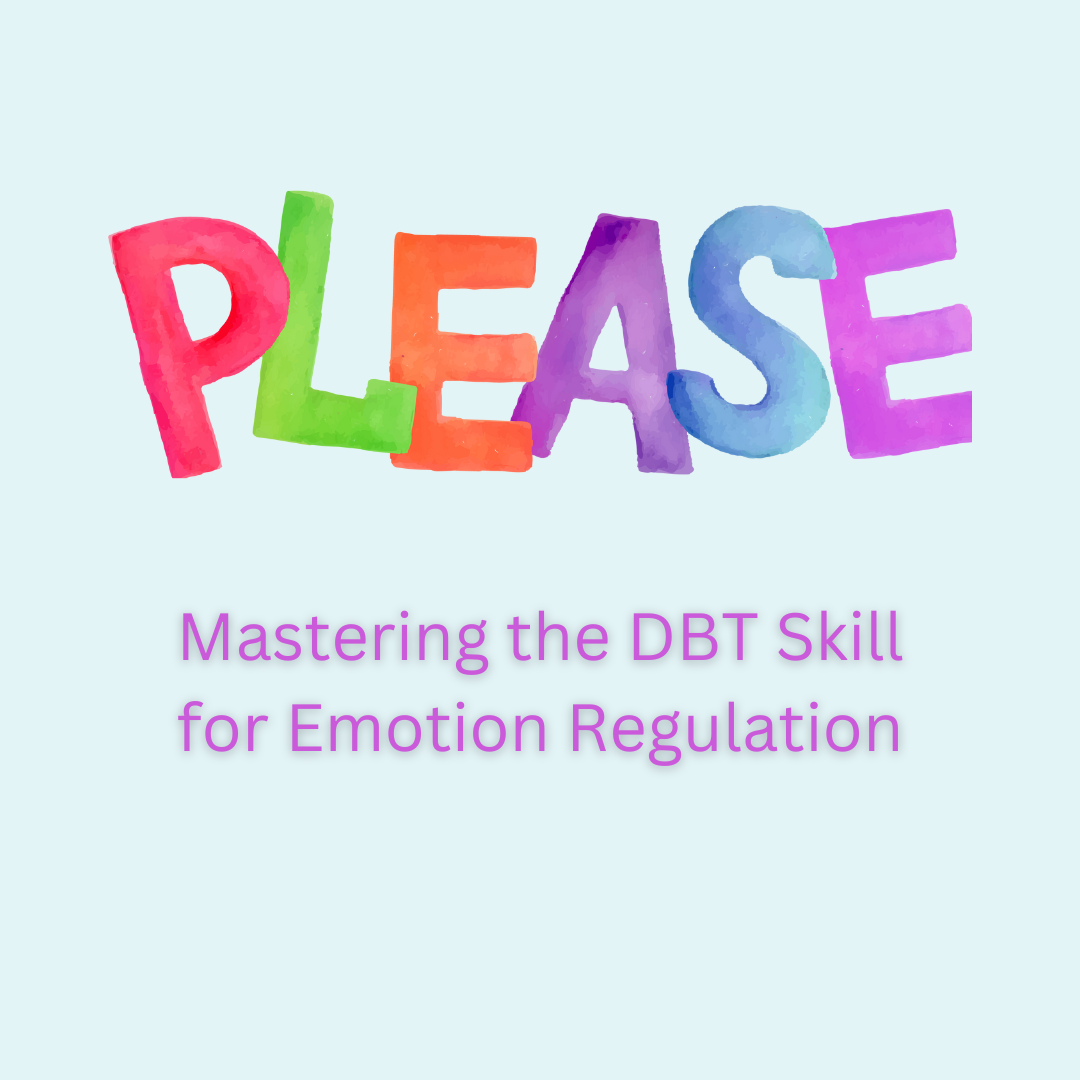DBT Skill for Emotion Regulation: Mastering the “Please” Skill
PLEASE is an acronym that stands for physical illness, loneliness, eating, avoidance, substances and exercise.
Does this pique your interest?? Learn more here!
The key to regulating emotion
Dialectical Behavior Therapy (DBT) is a powerful therapeutic approach designed to help individuals manage intense emotions and improve interpersonal effectiveness. One of the essential skills taught in DBT is the PLEASE skill, which serves as a foundational tool for emotional regulation and overall well-being. Let’s explore what the PLEASE skill entails, why it's important, and how you can incorporate it into your daily life.
What is the PLEASE Skill?
The PLEASE skill is an acronym that stands for:
P - Physical Illness
L - Loneliness
E - Eating
A - Avoidance
S - Substance Abuse
E - Exercise
Each component of the PLEASE skill addresses a specific area of self-care and emotional health. When individuals neglect these areas, they may find themselves more vulnerable to emotional dysregulation and impulsive behaviors.
Breaking Down the PLEASE Skill
1. Physical Illness: It’s essential to attend to physical health needs. Engaging in healthy behaviors, getting medical care and taking medications if/as prescribed keep us healthy and balanced so we can function at our optimal level.
2. Loneliness: Social connections play a crucial role in mental health. Feeling isolated can exacerbate emotional difficulties. Building a support network, whether through friends, family, or support groups, can help mitigate feelings of loneliness.
3. Eating: Nutrition affects both physical and mental health. A balanced diet can improve mood and energy levels. Being mindful of what you eat and ensuring you nourish your body can be a critical aspect of emotional regulation.
4. Avoidance: This refers to avoiding distressing situations or emotions. While it may provide temporary relief, avoidance often leads to increased anxiety and emotional turmoil in the long run. Learning to confront rather than avoid these feelings is essential for growth.
5. Substances: Using or abusing substances to cope with emotions can lead to a cycle of dependency and further emotional distress. Awareness of substance use patterns and finding healthier coping mechanisms are vital steps in recovery.
6. Exercise: Physical activity is a powerful tool for improving mood and reducing stress. Regular exercise can boost endorphins and promote a sense of well-being, making it easier to manage emotional challenges.
Why is the PLEASE Skill Important?
The PLEASE skill emphasizes the importance of self-care in managing emotions. By addressing these areas, individuals can create a solid foundation for emotional stability and resilience. When you take care of your physical health, cultivate social connections, eat well, face challenges, avoid substance use, and engage in regular exercise, you equip yourself with the tools needed to navigate life's ups and downs more effectively.
How to Incorporate the PLEASE Skill into Your Life
1. Conduct a Self-Assessment: Take some time to reflect on each component of the PLEASE skill. Are there areas where you could improve? Identifying your needs is the first step toward making changes.
2. Set Small Goals: Instead of overwhelming yourself with significant changes, set small, achievable goals in each area. For example, aim to add one more serving of vegetables to your daily diet or take a 10-minute walk a few times a week.
3. Build a Support System: Reach out to friends or family members to foster connections. Consider joining a local group or online community that aligns with your interests to reduce feelings of loneliness.
4. Create a Routine: Establish a daily routine that incorporates physical health, social interaction, healthy eating, and exercise. Consistency can help reinforce these positive habits.
5. Practice Mindfulness: Engage in mindfulness practices to help confront feelings instead of avoiding them. Techniques like meditation or journaling can provide clarity and insight into your emotional state.
6. Seek Professional Help: If you’re struggling with implementing the PLEASE skill, consider working with a therapist trained in DBT. They can provide guidance and support tailored to your needs.
Building Mastery in Self Care
Mastering the PLEASE skill is a vital step in enhancing emotional regulation and overall well-being in the framework of Dialectical Behavior Therapy. By focusing on physical health, social connections, nutrition, emotional confrontation, substance use, and exercise, you can cultivate a more balanced and resilient mindset. Remember, small changes can lead to significant improvements, so start incorporating the PLEASE skill into your daily life today, and empower yourself to navigate challenges with greater ease and confidence.

